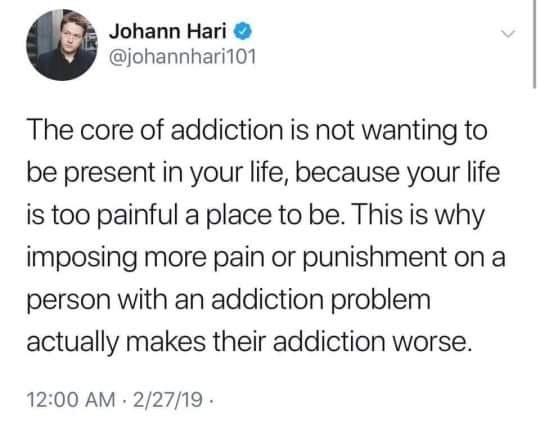this post was submitted on 25 Oct 2023
1359 points (95.6% liked)
People Twitter
8120 readers
1307 users here now
People tweeting stuff. We allow tweets from anyone.
RULES:
- Mark NSFW content.
- No doxxing people.
- Must be a pic of the tweet or similar. No direct links to the tweet.
- No bullying or international politcs
- Be excellent to each other.
- Provide an archived link to the tweet (or similar) being shown if it's a major figure or a politician.
founded 2 years ago
MODERATORS
you are viewing a single comment's thread
view the rest of the comments
view the rest of the comments

Or, hear me out, help those consuming them get out of that addiction and crush those who prey on them by selling drugs. They are the actual evil ones here.
On the one hand, you’re right. However, I would say most societies have already drawn that conclusion and have attempted to do what you say we should do. Can you think of any place that has been successful? Certainly not the US.
The US hasn't succeeded because they haven't really done shit. They will help people detox if they have insurance, or people can go to a state-run facility, which in most cases are horribly depressing jail-like environments. In those places they sell you the cure, which is a program developed by a guy in the 1930s based on an evangelical Christian program for sobriety. I'm sure you can guess but this program requires a belief in God to become sober and live a fulfilling life. You might hear about so called amazing treatment facilities but those places cost thousands of dollars a day, push the same "cure", and good luck getting insurance to pay for it.
I agree with your assessment of the US. The point I’m really trying to make is that I haven’t seen a successful implementation of this approach in any free country, even though most countries buy into the premise of going after drug dealers. Whether it fails because the implementation is all wrong or human failings, the fact that nobody has been able to get it right makes me wonder if it’s time to conclude that we aren’t going to solve it this way.
Portugal
I think you misread. I was saying that the idea of solving the drug problem by going after the supply is flawed because it’s never been successful.
Legalize them. Consistent supply means clear perception of the situation, control over dosing.
To heal from trauma a person must willingly face the thing that traumatized them. Unwilling encounter only deepens the trauma. If a person is addicted because reality has traumatized them, forcing them back against it doesn’t help. They need to have control, and it has to be their own choice to stop.
With a legal market, a person could ramp themselves down off heroin by reducing their dose 1% per day. They can fiddle with it, roll it around in their fingers, poke and prod at their habit and take it apart.
When supply is sporadic, the instinct that develops is to always be drawn, to always say yes. When supply is sporadic it mixes the thrill of the hunt with the drug. You score just by getting some, and you celebrate the win by taking it.
It’s a whole thing that doesn’t exist when you can always walk down the street to the 7-Eleven and grab a six pack of Horse Girls with your reese’s peanut butter cups and gatorade, and pop a couple of them while you watch the game.